Over the past 4 years I have started several businesses while working full time. These ventures have allowed me to do things I only dreamed about when I first started my career. They helped me land my dream job along with offers at Uber, Google & Twitter. They allowed me to get my own apartment in New York and take my Mom on a trip to Italy. And they have connected me with amazing people including Arianna Huffington, John Lee Dumas, Tayo Rockson & more. This post outlines the exact steps I took to start a business that made $20k+ in the first year.
Why Start A Business?
A few years ago I was lost.
I was stuck in a job I hated making far less than anyone in my social circle. If I came across a genie that granted me 3 wishes, I would have immediately spent 2 of them on moving to a new city and running my own business.
I spent the next weekend searching all over my apartment for a magic lap…No dice.
So I shifted my focus. I knew I wanted to do 3 things:
- Make enough money to stop worrying about it
- Move to New York City & get my own apartment
- Land a job at one of the world's leading tech companies
At the time I had less than a year of “real world” experience (all the in the medical field) and zero idea about how companies worked. I figured the environment couldn't be more perfect to start a business.
Over the next 6 months, I spent all of my time off the clock studying thought leaders in the “side hustle” space. I defined too many niches, came up with terrible business ideas, identified tons of prospects and sent over 1,000 cold emails. Eventually things fell into place around month 5.
I landed my first real client which eventually led to several more and around $20k+ over the course of the year. I was able to use that experience to completely switch careers from medicine to digital advertising while landing a $70,000+ raise in the process. All while working full time.
Now I'm going to teach you how to do the same.
This post covers each step you'll need to start your own side business, including:
- How To Choose Your Skills
- How To Define Your Niche
- How To Create Time To Grow Your Business
- Getting Your First Client
- Getting More Clients
- How To Set Your Pricing
- How To Automate The Entire Thing
If you have ever wanted to start a business in hopes of making more money, getting more experience or simply being your own boss, this is the most comprehensive guide on the internet. Ready?
Want To Land Your First Client In The Next 14 Days?
Step 1: Choose Your Skill(s)
The first thing we need to decide on is what we'll be selling. This can be the largest hurdle for people who have considered starting a business because the number of possibilities are overwhelming!
When we're faced with too many options our brain tends to go into freak-out mode where it defaults to minimizing risk and taking the safest route. That leads to objections like this:
- I don't have any marketable skills
- I don”t have any experience freelancing so no one will hire me
- There are already other people doing what I would do so why bother?
Have you ever asked yourself those questions when you thought about starting a business? If so, don't worry – it's actually totally normal. If you stick with me through the end of the guide, I'll show you why you shouldn't be concerned with any of those.
Here's what I want you to do.
- Grab a piece of paper (or open a fresh email)
- Write down 10 skills you have (in no particular order)
Don't think too much about this. Just write.
If one of the doubts I mentioned above creeps into your head when you think of an idea – get rid of it and write that idea down anyways. If you think that you have no skills anyone would want to pay for, try thinking about what you do at work every day. What kinds of projects do you work on? What skills are required for those projects?
If you have to take a 10 minute break – no problem. You will probably have a hard time coming up with 10 ideas and that's totally expected.
Here are the 10 I wrote down:
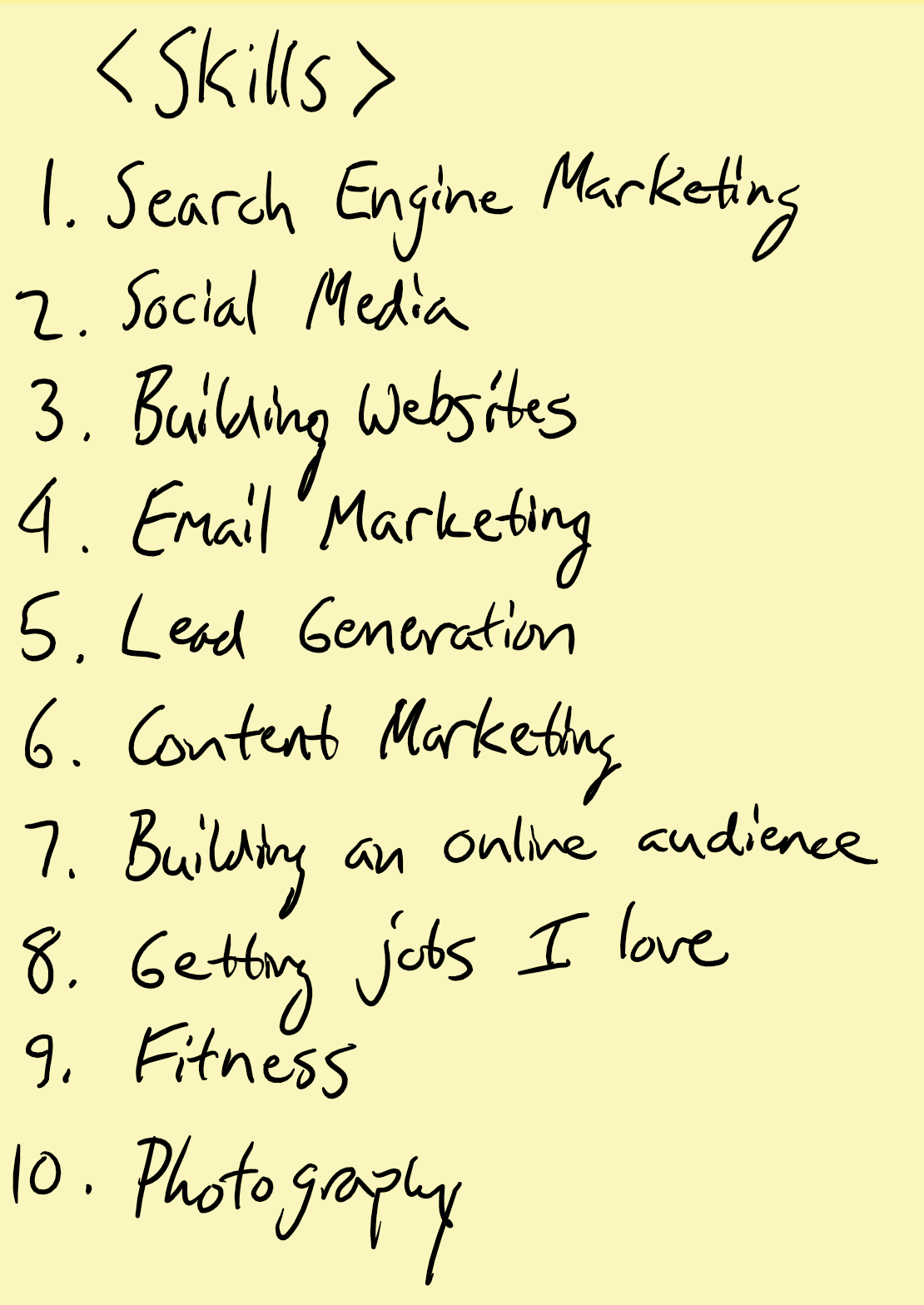
Notice how none of these are groundbreaking ideas – they are all being done by other people as we speak. Also, I included two things that I consider to be hobbies at the bottom. I know more about those things than the average person which means that I could potentially have the average person pay me for those services.
Key Takeaway: You don't need to be the #1 person in your field to start a business. You just need to know more than the person you are providing the service to.
Step 2: Define Your Niche
The next step is to define our target company. Most articles out there tell you that when you start a business your niche should be laser-focused, like Male Golfers, Ages 47 – 54 who suffer from back pain.
While I agree that it should be targeted, it's not reasonable to expect that you're going to know your target audience in that level of detail before you've even set up an email address.
You'll begin to hone in on your ideal niche as you go, but for now we're going to use the following process to determine our target audience (actually, we're going to choose 3).
Defining Your Initial Target Prospect
First, you're going to make a list of 50 people that you know. They can include everyone from your best friend's parents to a connection on LinkedIn you met at a conference last year. The only criteria they need to meet is that you must feel comfortable reaching out to that person.
Add these people into this spreadsheet I created for you along with their company type and industry (ignore the email column for now, we'll get to that later):
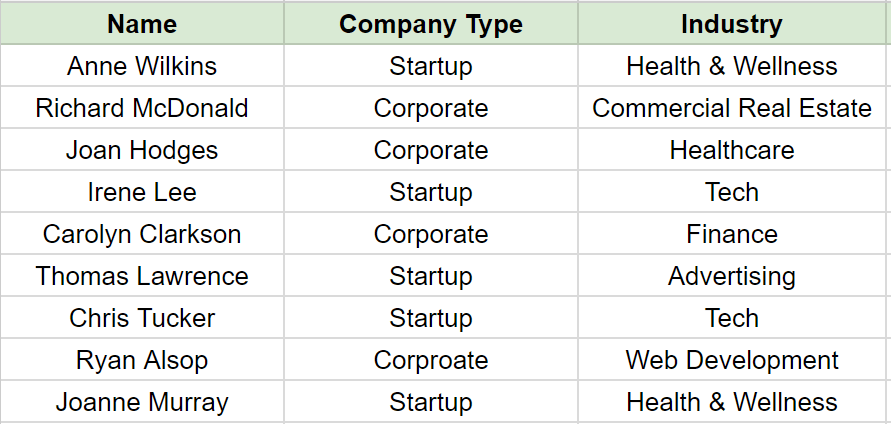
Now that we have our people, let's take a look at their company type and industry. Which industries and company types match up best with the skill you chose above?
If we take my list, I know that my marketing skills could benefit a tech company, but they could also benefit a health & wellness startup looking to build an audience. Additionally, know that it's much easier to sell into startups than corporations when you're first starting out. With that in mind, my ideal mix is:
Company Type: Startup
Industry: Advertising, Tech, Web Development & Health/Wellness
Let's say that your skill was Fitness, which is much less “business” focused. How would your mix change if that were the case?
Well, I know that people in Health & Wellness probably already know what their doing. However, people in the Tech space also tend to want to get into fitness but may not know where to start. In that case, my mix might be:
Company Type: Startup
Industry: Advertising/Tech
Now we have one “niche,” but my list here is only 10 people. I want you to try and find 3 different niches where one or more of your skills apply. Then I want you to assign each niche a number and label your spreadsheet (you can also highlight too if that helps):
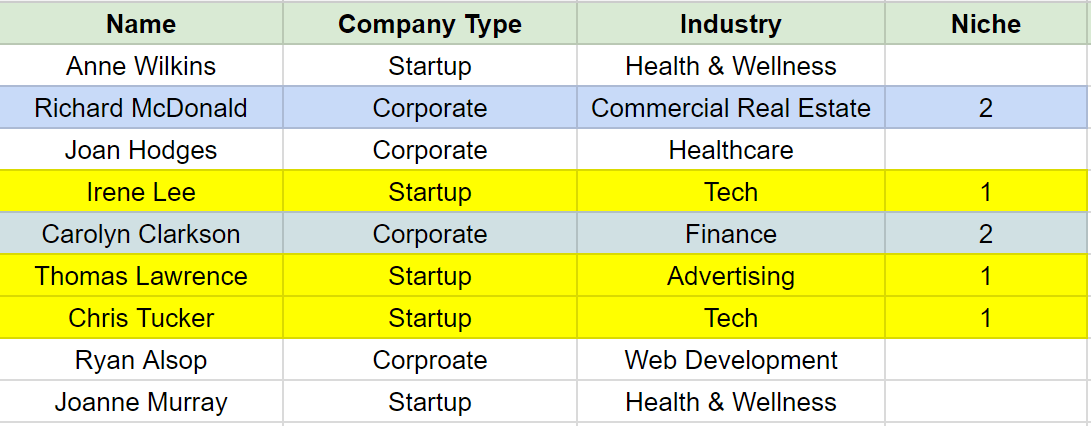
Congratulations! You just defined 3 areas that you can sell into and you have your first set of prospects.
If you're still having trouble deciding what your niche is, take Nathalie Lussier's advice and make your story your niche.
If your claim to fame is generating more leads within a specific vertical than anyone else on your sales team, your niche is helping companies in that vertical gain clients. Or maybe you were able to help skyrocket the social media presence of an eCommerce-based fashion businesses. If so, that's your niche. Draw on your previous experience to decide where to successfully focus your efforts.
Key Takeaway: Don't get caught up in finding a super-specific niche before you've ever booked a client. Keep things broad, take on a few clients and your niche will narrow over time.
Related Resources
- Tips To Help You Pick A Niche – Pat Flynn
- Overcoming The Fear of “Choosing A Niche” – Brennan Dunn
- How To Research A Profitable Niche – Lorna Li
Step 3: Create Time (And Be Consistent)
I have spent a lot of time reading about success. I've also spent a lot of time building businesses in hopes of chasing it. After sifting through the thousands of pages and lessons, I found that one thing had the greatest influence on whether I was successful or not:
Consistency
The ability to work on something every single day – regardless of how you feel, how crazy your job is or how many friends tell you to go to happy hour – is the difference between succeeding and failing when you start a business.
In order to be consistent, you have to create time. Time that you know is not going to be interrupted. For me, that means waking up at 5:30am. For you, early may work, or maybe late at night is your thing. Whatever you do, make sure that it's a natural fit for you. You don't want to feel like you have to drag yourself to do this, otherwise it will never work.
Put It In Your Calendar
Enough talk, let's put this into action. Open up your Google calendar and find a 1.5 hour block of time that works for you at least 5 days every week (yes, that includes weekends).
Create an event and set reminders for 1 hour before and 15 minutes before. Mark that time as “busy” on your calendar:

Hold Yourself Accountable
Now it's real – ink on paper. However, your calendar invite isn't going to get you out of bed the day after you went out a little too hard or help you say no to those free concert tickets to see Kanye. If we truly want to stick with this, we're going to need a little outside help.
I personally recommend StickK because I'm a competitive person who doesn't like losing. StickK lets you essentially bet yourself that you will start your business. You put down a dollar amount (I recommend $100) and you set a goal. Then you'll be assigned a “referee” who will hold you accountable. If you complete your goal, you get your $100 back. If you don't, that money is donated to the charity of your choice.
I can personally tell you that the thought of $100 being yanked out of my wallet has helped me push through many hangovers.
Related Resources
- How To Be Consistent: 5 Steps To Get Things Done, All The Time – Marie Forleo
- The 3 R's of Habit Change: How To Start New Habits That Actually Stick – James Clear
- How To Find Time To Start A Side Business – Steve Chou
Step 4: Getting Your First Client
Ok! Now that we've got our service and our niches nailed down, it's time to get some paying customers.
Since we don't have much in the way of a portfolio, we're going to want to start by aiming for a prospect where we have a personal connection. Then we're going to leverage the current experience that you have to land the deal.
Let's head back to our spreadsheet and look through the list of names that we highlighted in each niche. I want you to go ahead and rank each of these people by how likely they are to help you. Then we're going to reach out to each from top to bottom.
Finding Emails
If you don't already have their email, you can easily find it by using Mailscoop.io. Once you have it, go ahead and plug it into your spreadsheet for future reference.
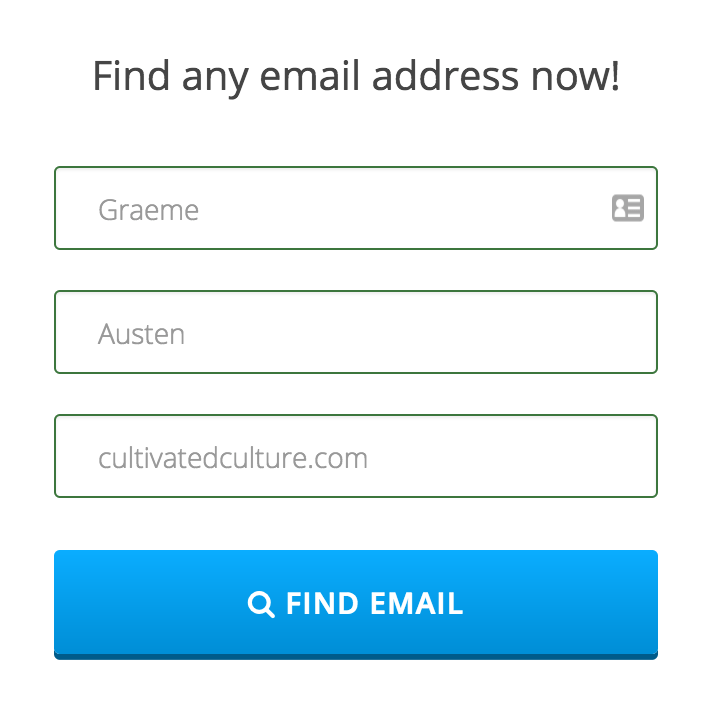
Reaching Out
Now we're going to reach out to our contact and ask them if they can help us set up a meeting. Here is the exact email template you can use for that:
Get The Free Warm Email Outreach Template
All you need to do is fill in their name, your skills and press send.
I would also highly recommend getting an email tracker such as Hubspot (free) or Yesware (better, but costs $). These will allow you to see if your prospect read your message and help you determine whether or not to follow up.
![]()
I personally use, and love, Yesware
If they open your email once, that trail is dead. However, if they open it multiple times across multiple days, feel free to follow up with them after 4-5 business days. I have personally followed up with people 8-10 times before eventually getting a response that led to a deal.
Preparing For The Meeting
Once the meeting is set, we want to make a compelling case for why this company needs your services. The best way to do that is using what I like to call The Audit Technique.
It's extremely simple and effective:
- Carefully review our prospect's current set up (website, social media, content, copy, health – whatever fits your service)
- Identify as many issues/improvements as we possibly can
- Determine the measurable impact of fixing these issues
- Share specific strategies for solving 2-3 of the issues and then showcase the potential result of fixing all of them
- Tell them that, regardless of whether or not they hire you, they can keep the audit report
See? Easy.
If you want an example of what that looks like, click the link below to download the audit I did for ‘s SEO:
Get The Free Sample Audit Report
Closing The Deal
In the beginning, most of your prospects aren't going to be seeking you out. That means that you have to convince them that your services will be worth their time and money. The best way to do that is via the following framework:
Address
We're going to start off the meeting by addressing the issues that you found with their site. Don't be too critical. The goal here is to make them feel good about their business while also letting them know that there is a lot of untapped potential out there.
Hand them your Audit Report and walk them through each of the issues. Explain what is happening, why it's hurting their business, and what the solution is.
Illustrate Potential
Once you've explained the issues, you want to clarify what the prospect is missing out on. The more quantifiable this is, the better. For example:
- Your call to action on the site isn't strong enough. Your conversion rate is probably 5% lower than where it should be. If your site gets 30,000 visitors a month, that's 1,500 people we're not capturing!
- Instagram accounts like yours typically see 100-300 followers every day, but you are only netting 20-30. If you implement the strategy I laid out here you should see an immediate boost within a few days. That could mean an additional 2,400 followers each month!
Show them how this is impacting their bottom line. Walk them through the math:
You: What is your typical sales conversion rate from your email list?
Prospect: Hmmm, it's around 3%
You: Wow, that's pretty good! And how much profit do you make from each sale?
Prospect: Typically we net around $150 per sale.
You: Awesome. Based on my audit, I'm seeing that we're missing out capturing an additional 3-5% of your site's traffic due to poor copy and CTA placement. I poked around and saw that your site gets ~30,000 visitors per month which means that we could be capturing an additional 1,500 people every month. Based on the numbers you just gave me, that's $6,750 per month!
If you charge $2,000 per month, that's a no brainer for your prospect. Any business owner would pay $2,000 if they knew it would result in an incremental profit of $4,750 – and you just made $24k this year!
Ask Them For The Sale
Now that you've proven out the value – ask them for the sale:
- Tell them that the Audit Report is theirs to keep regardless
- Reiterate the potential opportunity they have to gain
- Outline what next steps look like for hiring you
- Ask them if they want to move forward
Chances are good that they'll want some time to think about it. No worries at all – drop note on your calendar to follow up with them 72 hours later.
Boom! You just booked your first client.

Now I want you to rinse and repeat this process for everyone on your spreadsheet. If you can get your foot in the door, you can expect about a 10% close rate.
Related Resources
- Ask A Freelancer: Your First Client – Leah Kalamakis
- 7 Ways To Find Your First Client – Kayli Barth
- How To Start Your Freelance Career & Get Your First Client – Brent Galloway
Step 5: Getting More Clients
Landing your first client is by far the hardest part of starting a business.
It's like trying to cook a meal by yourself for the first time. Initially every new step in the recipe is totally foreign. You're not sure how the pieces fit together so you try to go by the book and inevitably end up adding too much salt. Once you've made that recipe 10 times, you have the basics down cold and you can start experimenting with new ideas.
Sales for your new business is no different.
Our next job is to identify more prospects to build up your client base. We're going to do that by reaching out cold to companies. It's easier than it sounds! I promise.
Identifying New Prospects
Referral
The easiest way to get new clients is via your existing customer(s). After you've been working with them for a bit (and are seeing good results), feel free to ask them if they know of anyone who might benefit from your services. Chances are good that they do.
This method is really effective because you're going into the new sale “warm,” meaning that the prospect trusts you because you were referred by a friend.
Once you get a solid client base, most of your new business is going to come via referrals.
LinkedIn
The second place we're going to look is on LinkedIn.
If you search for a company, there is a nifty little feature that shows you other companies people have looked at who were also interested in your client's company. This tends to be the fastest way to find similar companies.
If I type in MindBodyGreen (a wellness startup out of Brooklyn):

I will see companies that “People Also Viewed” a little farther down the page on the right hand side:
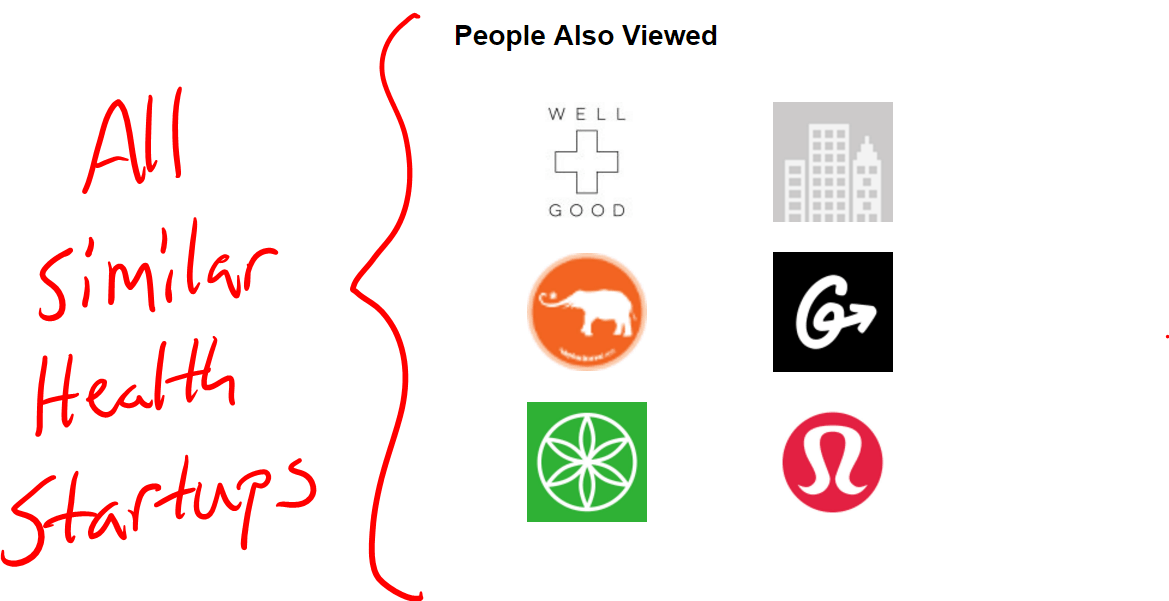
“List” Articles
Another way to find new prospects is to simply ask Google. Keeping our above theme, let's say our target company is a Health/Wellness Startup. All you need to do is head over to Google and type in some variation of:
Best Wellness Startups 2016
You want to be on the look for any articles that mention some type of list:
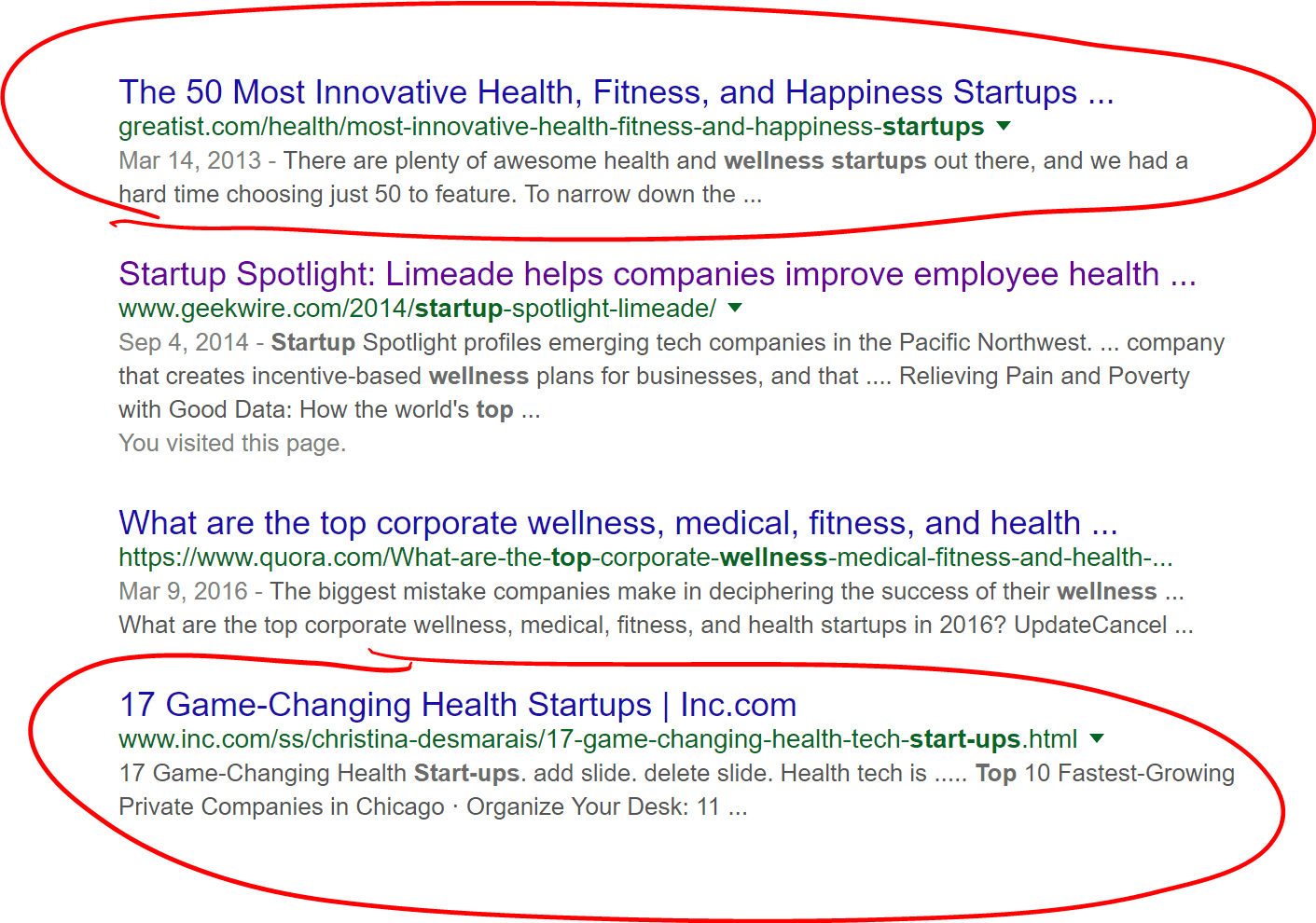
Take a few minutes to browse through those and add them to the list.
Cold Outreach
After going through the above steps, you should have a solid prospect pipeline of 20 – 30 companies. Now we're going to reach out to each of them and see if we can book a meeting.
In order to do that, we're going to need some contact info.
Identifying Influencers
The first thing you want to do is determine who you want to talk to. If you are offering marketing services, someone in HR is probably not going to be able to help your cause. Once we have that down, it's time to fire up LinkedIn again.
You're going to start by typing in Company Name + Department. In this case, let's say we are offering marketing services and The Muse is my target. I would type in:
“Marketing TheMuse.com”
And then I'm going to find 3 people of varying title levels in their marketing department. Ideally you want to start with the highest level possible (usually Chief Marketing Officer) and work your way down.
Add their names and title to a spreadsheet.
Finding Their Email
Using the same methods mentioned above, we are going to plug in their name and website to get their email addresses.
Reaching Out
This is where the rubber meets the road. We're going to reach out to each of contact at our company and we're going to do 3 things:
- Let them know that we reached out to all 3 of them
- Throw in a blurb about our services
- Give them an “out” to make sure we get to the right person
I have the exact template I used to land every single one of my deals ready to go for you. This template got me an 85% response rate and helped me close $10,000+ worth of deals. It even helped me get in touch with Arianna Huffington and featured on Huffington Post:

Hit the link below to get it:
Get The Free Cold Email Outreach Template
Once you have the meeting set up, use the Audit framework I talked about above to close the deal.
Related Resources
- How To Get Started In Freelance Writing – An Interview With Carrie Smith
- How To Grow Your Freelance Business In Under Two Years – Steve Strauss
Step 6: How To Define Your Pricing
Ahh yes, the (literal) $64 question of pricing:
- How much should I charge?
- Should I bill hourly or at a fixed rate?
- Do I charge up front or at the end?
The list goes on.
Before we dive in, I'll say this. When it comes to pricing, there is no perfect formula. One client may be willing to pay $5,000 for something that another client wouldn't pay $250 for. The best you can do is collect as much information as possible and pull the trigger.
Hourly Rates or Fixed Pricing?
Let's start with the age-old question of hourly vs. project-based pricing. You could talk to 10 freelancers and probably get a 50/50 split on opinions. With that in mind, I'm happy to throw mine in the mix…
My answer? Both!
When you're just starting out, hourly pricing is far more advantageous for you. You're taking on new clients and projects without much context. You're going to be learning, making mistakes and working with some not-so-great clients along the way – why not get paid for it?
However, once you have a solid grip on your craft as it relates to the freelancing world, it's time to switch over to project-based pricing. Let me give you an example.
Let's say you're a web designer.
When you're just starting out, you're figuring out your niche and what they want. First, you have to do research to figure out what tools and templates are best for each client's job. Then you most likely have to do some coding from scratch. Inevitably, there will be several rounds of revisions. This could take a LOT of hours. You want to make sure you're paid for each and every one of them.
Now fast forward 8 months. You've defined your niche, you have some pre-coded templates saved and you've adjusted your onboarding process to ensure that you get all of the specs from day 1. This allows you to knock out your websites in ~6 hours.
Websites are like a 24/7 salesperson for a company. The ROI isn't even quantifiable – and smart business people know this. Which is why they're willing to pay thousands of dollars up front. Even if you're charging top dollar, let's say $200/hour, you're only going to make $1,200 on this site. However, your client may have been willing to pay $5,000 because they know that as soon as the site is up and running, they can start selling their $200 product with an 80% margin. That $5,000 is going to pay itself back real quick.
Making sense? Cool, let's keep moving.
How Much Should I Charge?
Knowing that there is no cookie-cutter formula for determining your price, there are some steps we can take to help ourselves.
The first is figuring out why the client's budget is.
Determining The Client's Budget
The easiest way to do this is just ask.
“Do you all have a budget already carved out for this project? Is is greater than X?”
You want to add in the last piece to weed out the cheaper clients. Remember, price is a representation of quality. If you charge what everyone else charges, your client will expect that your work is the same quality as theirs. Your work is better than theirs, ask for more than market rate.
If the client pushes back, tell them that the project cost can range from $500 – $5,000 depending on their budget and the scope of the project. You want to make sure that you're giving them the best service for their budget. Typically that ends any speculation around sharing.
When they give you a number, add 10% to the top end of it (e.g. if they tell you that their budget is $5,000, make it $5,500 in your head).
How Much Do You Need To Actually Make Money?
The first thing we'll need to do here is calculate our hourly rate. Go to this calculator and enter your current salary to determine your hourly rate. Now make an estimate of how many hours this project will take you. Multiply that out and then add an additional 10%.
Hourly Rate X # of Hours X 10% = Bare Minimum
This number is the bare minimum someone could charge for this project and hope to scrape by. You will not be charging this amount. If the client's budget is below this number, forget about it. If the client's budget is well above this number, feel free to use the 75th Percentile rule below.
The 75th Percentile
Now write down the number they gave you as a budget (+10%) and the bare minimum number you just calculated. Find the 75% mark between those two numbers – this is probably a good price to land on as the minimum to ask for. Still, we're negotiating here so save this for last and ask for something ~20% higher up front.
Related Resources
- How To Create Your Hourly Rate For Digital Marketing Services – Marketing Profs
- How To Work Out Your Hourly, Daily or Project Rate – Ben Matthews
- How To Set Your Rates For Freelance Writers – Emma Siemasko
Step 7: Automation
Offering a service is by far the easiest way to begin making money on the side. However, you're still trading dollars for hours which is never ideal. Your ability to make money is capped by your capacity to take on clients.
Once you reach critical mass, it's time to consider automation. Actually, the time to begin considering is just before you reach that point. Here's how to do it.
Get Some Help
Once your margins are healthy and you have some cash to spare, it's time to begin outsourcing some of this work. Head over to Upwork or Freelancer.com and post a job. Your goal is to find someone whose work you can trust – this may take a few projects and you may go through several freelancers.
Once you find your person, offer to hire them on outside of Upwork for a little more money. They'll gladly accept.
Button Up Your Onboarding Process
It's best to start doing this from the moment you book your very first client. As you go through the project, take note of what information is critical to completing the project with as little back and forth as possible.
Each time you get a new client, ask for more info up front. After several clients, you should have a document built out that asks for every single detail that you need to complete the project. It should pass the “Context Test” meaning that you should be able to hand it to someone with no context and they could complete the project with just the information on that page.
Focus On Word Of Mouth
Whenever you successfully complete a project for a client, ask them if they know of anyone who could benefit from your services. Chances are good that they do. As your business grows, most of your clients are going to come from word of mouth, but you want to make an effort to focus on that from the start.
Tying It All Together (A.K.A. The Full Automated Process)
Now your sales process should look like this:
- New client comes in via word of mouth referral
- You send them your onboarding form which, once submitted, goes straight to your trusty freelancer
- Freelancer completes the work and sends it to the client
- Client is happy and you barely lifted a finger
Boom!
Now quit reading. It's time to get out there and make it happen!
Want To Land Your First Client In The Next 14 Days?




































Awesome blog post Austin. I’ve been dying for some more tips on how to get some more clients. Also I really like what you are doing here with your blog. Maybe we can work together sometime in the future on a guest blog or something. Just reach out!
They say, if you want to be rich, then get into a business. However, when you opt to start one, make sure you put your mind and heart into it so that you will succeed in running your business.
Having your own business in any capacity removes the limit on earning potential. At a 9-5 job, you make your salary and that’s that. You make more money if you get a raise approved and you can only do that, what, every couple of years? The only limit on your earning potential in your business is the number of clients you can take on or products you can sell.